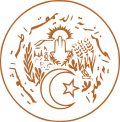2020s
In 2020, Israeli Foreign Minister Gabi Ashkenazi said that he was interested in improving relations with Algeria and other Arab countries. [14] Also in 2020, amidst Gulf states' call to normalize relations, and the Hirak political renewal impact on the country's internal affairs, some voices were calling on reviewing the country's bilateral relations in a way that benefits the country. [15]
President Abdelmadjid Tebboune, during an interview with Algerian media on September 20, 2020, stated, "We have noticed a kind of scramble towards normalization. This is something we will never participate in, nor bless, the Palestinian issue is sacred for us and it is the mother of all issues and will not be resolved except by establishing a Palestinian state, with the 1967 borders, with Holy Jerusalem as its capital," [16] The statement refers to the ceremony that took place at the White House in the United States on September 15 of the same year, during which the United Arab Emirates and Bahrain signed normalization agreements with Israel, mediated by U.S. President Donald Trump. [17]
On February 3, 2025, Algerian President Abdelmadjid Tebboune, reaffirmed that Algeria will not normalize relations with Israel before the establishment of a Palestinian state. In an interview with the French newspaper Le Point, he stated, 'Of course, the day that happens,' when asked if Algeria would consider normalization after a Palestinian state is created. Tebboune emphasized that Algeria’s priority remains the establishment of a Palestinian state. [18]

